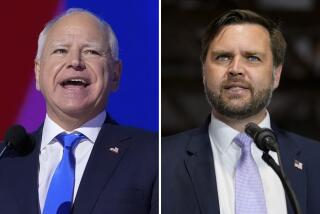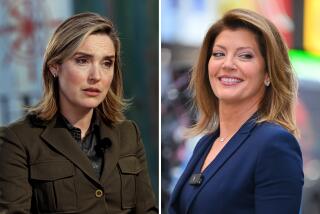Aides Agree to Sept. 25 as Probable Date for First Debate Between Bush, Dukakis
- Share via
WASHINGTON — The schedule for scaled-down presidential debates began to fall into place Thursday, with representatives of George Bush and Michael S. Dukakis announcing that the candidates will probably meet on Sept. 25 in Winston-Salem, N.C., for their first debate and on Oct. 13 or 14 at a site to be selected for a second.
In addition, vice presidential candidates Lloyd Bentsen and Dan Quayle will face off during the week of Oct. 3, according to the tentative schedule reached by the campaign officials.
The schedule means that the first debate, which will be at Wake Forest University, will compete for television viewers with prime-time coverage of the Summer Olympics, and that the second debate will take place nearly four weeks before Election Day--enough time to allow a candidate to try to recover from an embarrassing gaffe.
Bush Gets What He Wanted
In the apparently resolved debate schedule, Bush appears to have gained all he sought in the negotiations: two debates rather than the four sought by Dukakis and dates the Bush camp preferred, including a final debate well before Election Day.
“It’s about as good as we’re going to do,” says Richard Moe, an adviser to the Dukakis campaign.
The agreement worked out by the chairmen of the two campaigns--James A. Baker III representing Repubican nominee Bush and Paul P. Brountas representing Democratic nominee Dukakis--during several hours of meetings Thursday in Washington left unresolved several important matters, including the site of the second presidential debate, the date and site of the vice presidential debate, and the format, topics and lengths of each debate.
“I think that what we had was a cooperation today that we haven’t seen previously. We reached an agreement to have three debates and that’s the important thing,” Brountas told reporters.
“We are still discussing format, staging and the length of the debates and we will continue to carry on those discussions,” Brountas said after the meeting with Baker. “We believe we made good progress. This will be an opportunity for the American people to see presidential candidates debating face-to-face and man-to-man.”
Olympics, Baseball Playoffs
Much of the debate over the debates has hinged on the number and timing of the meetings, during a period in which the prime-time television schedule is dominated by the Olympic broadcasts from Seoul, South Korea, and television coverage of the major league baseball playoffs and the World Series.
Although the audience for the debates has in the past been considerably less than that for the major networks’ entertainment programs, Moe stressed the debates’ importance in the political race because “there are a lot of undecided voters out there without firm commitments” to either candidate.
Thus, he said, “the debates can be very decisive.”
Of the major television networks, NBC has said it would not interrupt its coverage of the Olympics to present the debates but would air a tape of the debate after 2:30 a.m. EDT Sept. 26, when its Olympic coverage of Sept. 25 ends. ABC, CBS, and CNN said they would broadcast the first debate live.
In New York, Joseph Angotti, vice president for political coverage at NBC News, said Thursday that, when the presidential debate commission, which is likely to sponsor the Sept. 25 debate, was first formed and started setting dates, “we explained to them that we would not be interrupting the Olympics.
‘Not NBC’s Problem’
“ABC explained to them that it would not be interrupting (its baseball) playoffs or Monday night football. The fact that George Bush limited his debate exposure to those dates when all these events are going on is not NBC’s problem. Nor is it ABC’s problem. That’s a problem the parties have. And it’s obviously not a problem to one of the two camps.”
More than half of NBC’s Sept. 16-Oct. 2 telecasts of the Summer Olympics will be in prime time. NBC purchased rights to the Games for $300 million and is spending another $140 million for production facilities and costs.
With an average rate of $330,000 for a 30-second commercial in prime time, the network expects to get $550 million in gross advertising revenue.
Michael Eskridge, NBC’s vice president in charge of the Olympic coverage, defended his network’s decision. Asked about potential criticism from those who think that NBC is putting profit over public service in not airing the first debate live, he said: “I think we’d be doing a greater service to the viewing public, who will have two other options to watch the debate, to give them an option of live Olympics activity that happens once every four years.”
James Gerstenzang reported from Washington and Jay Sharbutt from New York.
More to Read
Get the L.A. Times Politics newsletter
Deeply reported insights into legislation, politics and policy from Sacramento, Washington and beyond. In your inbox twice per week.
You may occasionally receive promotional content from the Los Angeles Times.










